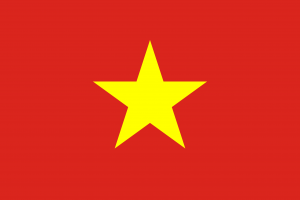Language/Vietnamese/Vocabulary/Family
Chào! Vietnamese Learners! 😃
➡ In today's lesson you will learn some vocabulary related to FAMILY MEMBERS in Vietnamese.
Happy learning!
With the completion of this lesson, consider investigating these related pages: Seasons, Nature and Environment, Geometry & Days of the week.
Culture and Language[edit | edit source]
If you want to reach out to family members, things get tricky, but here are some basic rules:
- the parents: ba (the father in South Vietnam); bố (in North Vietnam) / mẹ (closer connotation); my. If your parents address you in Vietnamese, you are "con" (child in Vietnamese). So you are going to address them by using "con" to say "I".
- big brothers and sisters: anh / chị
In order to locate the person's place within the family, we use numbers from the number 2 to 10. If you have more than 9 brothers and sisters, we will always use the number 10, but families with more than 10 children are rare!
Example
- for your older brother: anh 2 (hại); your older sister: chị 2 (hại)
- for your younger brother, the second in the family, if he is older than you: anh 3 (ba); if it's a girl: "chị 3". And so on.
- if you are older, go to your little brother or little sister "em"
- your uncle and aunt:
- maternal: cậu / dượng (if it is your aunt's husband) - dì / mợ (your uncle's wife)
- paternal: chú - cô / thím (wife of your uncle)
Be careful, if your uncle is older than your father, use bác. For this uncle's wife, also use bác.
The rule of numbers, in order to locate the place in the family, also applies here. For your uncle and aunt, you are "con" ("child" in French), so you are going to use "con" again to say "I".
- your grandfather and your grandmother:
- maternal: ông ngoại (grandfather) / bà ngoại (grandmother)
- paternal: ông nội / bà nội
If you mean "I", use all of the above rules as if you were addressing the third person and apply them to yourself. The "tôi" ("I") is also used but if you want to respect the rules of courtesy, try to familiarize yourself by situating your place according to your interlocutor. The above rules apply to the person in front of you as well as to yourself.
- your cousin:
- anh / chị (if your cousin's parent is the older brother or sister of one of your parents). The number rule applies but is not mandatory. You can just follow your cousin's first name after "anh / chị".
- em (if your cousin's parent is the younger brother or sister of one of your parents). In this case, you can also directly call your cousin by his first name.
You may have understood that seniors are entitled to a lot of respect. In Vietnam, the Vietnamese give even more respect to the dead than to the living, where each family has an altar that honors their deceased ancestors.
gia đình - family[edit | edit source]
| Vietnamese (Tiếng Việt) | English |
|---|---|
| ông bà | grandparents |
| ông (nội, ngọai) | grandfather |
| bà | grandmother |
| cha mẹ | parents |
| cha | father, dad |
| (người) mẹ | mother, mom |
| chồng | husband |
| vợ | wife, spouse |
| loài người | human being |
| đàn ông | man |
| phụ nữ | lady |
| bác, chú, cậu | uncle |
| bác, cô, dì | aunt |
| cháu trai | nephew |
| cháu gái | niece |
| anh em họ
chị em họ |
cousin |
| cậu bé, con trai | boy, son |
| cô bé, con gái | girl, daughter |
| anh | brother |
| em, chị | sister |
| cặp song sinh / cặp sinh đôi | twins |
| trẻ em | child |
| em bé | baby |
| bạn | friend |
| bạn trai
bạn gái |
boyfriend
girlfriend |
| hàng xóm | neighbor |
| khách | guest |
Videos[edit | edit source]
How to Talk about Your Family in Vietnamese?[edit | edit source]
Family Words In Vietnamese (Part 1)[edit | edit source]
Family Words in Vietnamese (Part 2)[edit | edit source]
Sources[edit | edit source]
- https://vietnamoriginal.com/notre-blog/decouverte-de-la-culture-vietnamienne-115.html
- https://www.youtube.com/watch?v=pU5oeh3e-3g
- https://www.youtube.com/watch?v=qgVs9mSirbM
- https://www.youtube.com/watch?v=pU5oeh3e-3g
- https://wikipedia.org
Other Lessons[edit | edit source]

